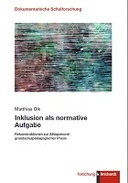Explore

The term inclusion is used to refer to moments of change on several social levels. This study finds its starting point in distinguishing between affirmations of a social, an institutional, and a professional change in the context of primary schools’ developmental claim of inclusion. Against this background, inclusion becomes comprehensible as a counterfactual language game. In its course normativity(ies) are constantly negotiated and produced. For primary school teachers, whose actions are based on the claim of inclusion, an axiological task of professionalization arises. They have to translate the normativity(ies) of inclusion into a practical everyday morality. In doing so, they must mediate between institutionalized expectations, the self-claim of inclusion, and the inherent logic of organizational practice. Thus, within the organization of an inclusion-oriented primary school, different everyday moral milieus emerge. This study aims to make these milieus understandable in order to contribute to the resolution of the desideratum of a specific perspective on the profession of the primary school teacher. On the other hand, a view on the school development claim of inclusion is to be offered that refers to the profession of the primary school teacher. Following educational biographical research, the reconstructive study finds access to the practical everyday morals of pedagogical actors in practices of (professional) biographical speaking. The core sample consists of pedagogues of a primary school under construction, which offensively formulates its inclusion-oriented development claim. In three dimensions, practices of normative relevance emerge in the documentary interpretation. These are (1) the handling of primary school traditions, (2) the relationship of the pedagogical self to colleagues, and (3) the possibilities and limits of pedagogical action in the confrontation with deviant students. Four ethos-types can then be abstracted as everyday moral milieus. In these, the different manifestations of the three normative dimensions stand in ideal-typical relationships. Against the background of a praxeological definition of pedagogical professionalism and professionalization, the type of the ethos of adaptation emerges as the most clearly professionalized. The expansion of the sample to include the cases of a ‘democratic’ primary school shows that the simultaneity of stability in pupil-related activities and the dynamics related to the developmental claim correspond empirically with the claim of inclusion in the ethos of adaptation.
This book is included in DOAB.
Why read this book? Have your say.
You must be logged in to comment.
Rights Information
Are you the author or publisher of this work? If so, you can claim it as yours by registering as an Unglue.it rights holder.Downloads
This work has been downloaded 43 times via unglue.it ebook links.
- 43 - pdf (CC BY-NC-ND) at Unglue.it.
Keywords
- Dokumentarische Methode
- Ethos
- Grundschule
- Inklusion
- Lehrer*innen
- Moral
- Normativität
- Praxis
- Professionalisierung
- thema EDItEUR::J Society and Social Sciences::JN Education::JNF Educational strategies and policy::JNFK Educational strategies and policy: inclusion
- thema EDItEUR::J Society and Social Sciences::JN Education::JNL Schools and pre-schools::JNLB Primary and middle schools
- thema EDItEUR::J Society and Social Sciences::JN Education::JNM Higher education, tertiary education::JNMT Teacher training
Links
DOI: 10.35468/6096Editions

